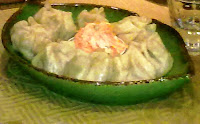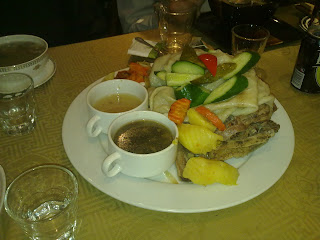"I'm going to order a bottle of vodka and meat dumplings for the table; after that you are on your own," said Dorj, our host in Ulaan Baator. Dorj had not been happy when we told him we wanted to try Mongolian food. "It's nothing but greasy meat and flour," he grumbled. So this was his way of washing his hands off the matter: beyond the vodka and dumplings, he was not prepared to vouch for anything.
I perused the menu. Several varieties of "energy soup" jumped out at me: soups made from various organs of sheep and goat, rich with red blood cells alleged to impart said energy. I thought of my foodie failure with the sea cucumbers a few nights before, and resolved to have more guts this time. I opted for a soup featuring intestine, kidneys and liver. "Less Energy Soup," it was called. This was in contrast to the more robust "Energy Soup," which had all of the above plus lung and brain. I guess there were limits as to how far I could tap my inner Mongolian. For the main course, we chose mutton ribs and spine -- a dish serving 2-4 people.
By now the dumplings and vodka had arrived. Dorj had ordered two types: steamed dumplings, called buuz, and fried ones, called khuushuur. The steamed ones, he explained, were eaten in winter, typically around new year celebrations. These could be frozen by the hundreds, and easily reheated to serve to guests. The fried ones -- bearing a strong resemblance to large empanadas -- were better eaten fresh, and were more popular in summer when they are sold at street stands. The heat of the just-fried kuushuur on the finger tips is good for circulation of the blood, he explained.
Such good choices! I loved them both, especially the khuushuur, which were indeed piping hot, just the right amount of greasy, and filled with wonderfully spiced meat. Buuz were good too, the steamed meat bathing in its own gravy inside a small dumpling sealed with a top knot. I was a bit taken aback by the vodka -- a whole bottle of Chinggis Khaan Black Label had arrived for the four of us. "Don't worry," said Dorj.
I was so much enjoying this portion of the meal that I sort of wished we had left it at that. I was in heaven with what we had going. The soup, when it arrived, was okay; certainly nothing I couldn't stomach. It was sort of watery though, bits of organ floating in a thin broth. I helped myself to more dumplings. Dorj poured another round of vodka.
Then came the main course. It quickly became evident why this was a dish for 2-4 people. This was no serving of individual ribs with a side of spine: the ribs of the sheep were still attached to their respective vertabrae. Basically, the entire upper half of the carcass had been plonked on a big platter. As advertised, it came covered in broad noodles and a generous amount of steamed vegetables.
So we dug in, even Dorj. "Not as greasy as I thought," he proclaimed. He looked quite sheepish at the small salad he had ordered for himself. I enjoyed the ribs too -- anyone who has eaten with me knows how I love to eat meat off the bone. But despite Dorj's pronouncement, it was a little heavy, so I was glad when he poured another round of vodka to help it down.
For those who are thinking that this menu must have been designed for tourists, I should note that this was low tourist season and we were probably the only foreigners in the place. But perhaps the Mongolians think of it as a sort of Disneyland rather than anything to do with themselves. At least three of the tables were there to celebrate children's birthday parties. To mark the occasion, the lights would be dimmed, a recorded version of "Happy Birthday" in English would be played, and a troupe of waitresses dressed in full Mongolian costume would accompany the song with tambourines and other percussion instruments. Remembering these scenes still makes me smile.
By night's end, all the dumplings were gone, a mess of bones was left on the platter, and the vodka bottle was drained. Dorj had been right: the dumplings were the best thing, and there had been no need to worry about the full bottle of Chinggis being too much. Always listen to your host.
For travelers: if it's dumplings you're after, there is no need to go to a "Mongolian restaurant". The streets of Ulaan Baatar are strewn with Khaan Buuz -- small shops serving steamed dumplings -- and in summer no doubt it will be hard to avoid street peddlers selling khuushuur. Also, do avoid the Chinese restaurant in the Chinggis Khaan Hotel. It's obscenely overpriced. For vegetarians, try the broccoli soup at the shabby-chic Italian restaurant called Veranda: thick and green, this was Dorj's choice when left to his own devices.
I perused the menu. Several varieties of "energy soup" jumped out at me: soups made from various organs of sheep and goat, rich with red blood cells alleged to impart said energy. I thought of my foodie failure with the sea cucumbers a few nights before, and resolved to have more guts this time. I opted for a soup featuring intestine, kidneys and liver. "Less Energy Soup," it was called. This was in contrast to the more robust "Energy Soup," which had all of the above plus lung and brain. I guess there were limits as to how far I could tap my inner Mongolian. For the main course, we chose mutton ribs and spine -- a dish serving 2-4 people.
 |
| Buuz -- steamed dumplings |
 |
| Khuushuur -- fried dumplings |
I was so much enjoying this portion of the meal that I sort of wished we had left it at that. I was in heaven with what we had going. The soup, when it arrived, was okay; certainly nothing I couldn't stomach. It was sort of watery though, bits of organ floating in a thin broth. I helped myself to more dumplings. Dorj poured another round of vodka.
Then came the main course. It quickly became evident why this was a dish for 2-4 people. This was no serving of individual ribs with a side of spine: the ribs of the sheep were still attached to their respective vertabrae. Basically, the entire upper half of the carcass had been plonked on a big platter. As advertised, it came covered in broad noodles and a generous amount of steamed vegetables.
So we dug in, even Dorj. "Not as greasy as I thought," he proclaimed. He looked quite sheepish at the small salad he had ordered for himself. I enjoyed the ribs too -- anyone who has eaten with me knows how I love to eat meat off the bone. But despite Dorj's pronouncement, it was a little heavy, so I was glad when he poured another round of vodka to help it down.
For those who are thinking that this menu must have been designed for tourists, I should note that this was low tourist season and we were probably the only foreigners in the place. But perhaps the Mongolians think of it as a sort of Disneyland rather than anything to do with themselves. At least three of the tables were there to celebrate children's birthday parties. To mark the occasion, the lights would be dimmed, a recorded version of "Happy Birthday" in English would be played, and a troupe of waitresses dressed in full Mongolian costume would accompany the song with tambourines and other percussion instruments. Remembering these scenes still makes me smile.
By night's end, all the dumplings were gone, a mess of bones was left on the platter, and the vodka bottle was drained. Dorj had been right: the dumplings were the best thing, and there had been no need to worry about the full bottle of Chinggis being too much. Always listen to your host.
For travelers: if it's dumplings you're after, there is no need to go to a "Mongolian restaurant". The streets of Ulaan Baatar are strewn with Khaan Buuz -- small shops serving steamed dumplings -- and in summer no doubt it will be hard to avoid street peddlers selling khuushuur. Also, do avoid the Chinese restaurant in the Chinggis Khaan Hotel. It's obscenely overpriced. For vegetarians, try the broccoli soup at the shabby-chic Italian restaurant called Veranda: thick and green, this was Dorj's choice when left to his own devices.


No comments:
Post a Comment